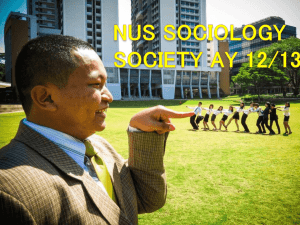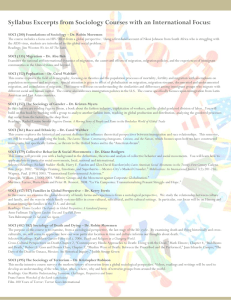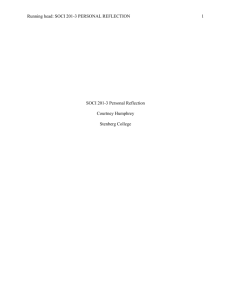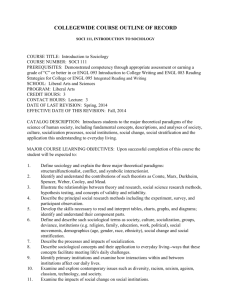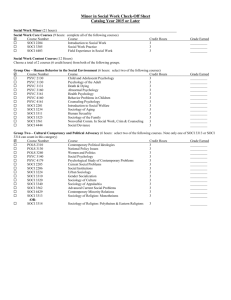Sociology
advertisement
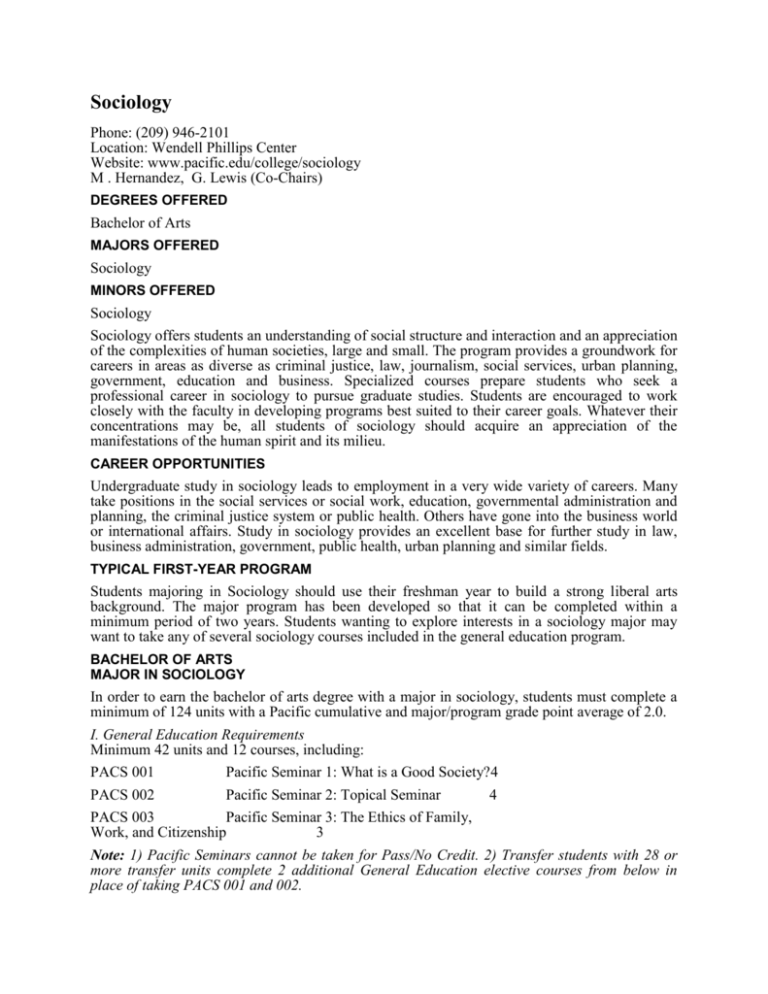
Sociology Phone: (209) 946-2101 Location: Wendell Phillips Center Website: www.pacific.edu/college/sociology M . Hernandez, G. Lewis (Co-Chairs) DEGREES OFFERED Bachelor of Arts MAJORS OFFERED Sociology MINORS OFFERED Sociology Sociology offers students an understanding of social structure and interaction and an appreciation of the complexities of human societies, large and small. The program provides a groundwork for careers in areas as diverse as criminal justice, law, journalism, social services, urban planning, government, education and business. Specialized courses prepare students who seek a professional career in sociology to pursue graduate studies. Students are encouraged to work closely with the faculty in developing programs best suited to their career goals. Whatever their concentrations may be, all students of sociology should acquire an appreciation of the manifestations of the human spirit and its milieu. CAREER OPPORTUNITIES Undergraduate study in sociology leads to employment in a very wide variety of careers. Many take positions in the social services or social work, education, governmental administration and planning, the criminal justice system or public health. Others have gone into the business world or international affairs. Study in sociology provides an excellent base for further study in law, business administration, government, public health, urban planning and similar fields. TYPICAL FIRST-YEAR PROGRAM Students majoring in Sociology should use their freshman year to build a strong liberal arts background. The major program has been developed so that it can be completed within a minimum period of two years. Students wanting to explore interests in a sociology major may want to take any of several sociology courses included in the general education program. BACHELOR OF ARTS MAJOR IN SOCIOLOGY In order to earn the bachelor of arts degree with a major in sociology, students must complete a minimum of 124 units with a Pacific cumulative and major/program grade point average of 2.0. I. General Education Requirements Minimum 42 units and 12 courses, including: PACS 001 Pacific Seminar 1: What is a Good Society?4 PACS 002 Pacific Seminar 2: Topical Seminar 4 PACS 003 Pacific Seminar 3: The Ethics of Family, Work, and Citizenship 3 Note: 1) Pacific Seminars cannot be taken for Pass/No Credit. 2) Transfer students with 28 or more transfer units complete 2 additional General Education elective courses from below in place of taking PACS 001 and 002. One course from each subdivision below: Social and Behavioral Sciences IA. Individual and Interpersonal Behavior IB. U.S. Studies IC. Global Studies Arts and Humanities IIA. Language and Literature IIB. Worldviews and Ethics IIC. Visual and Performing Arts Natural Sciences and Mathematics IIIA. Natural Sciences IIIB. Mathematics and Formal Logic IIIC. Science, Technology, and Society or a second Natural Science Note: 1) A complete list of the courses that satisfy the subdivisions above can be found in the front General Education section of this catalog and the online course search. 2) No more than 2 courses from a single discipline may be applied to meet the requirements of the general education program. II. Diversity Requirement Complete one diversity course 3-4 Note: 1) A complete list of the courses that satisfy the requirement above can be found in the front Diversity Requirement section of this catalog and the online course search. 2) Transfer students with 28 units or more transfer units prior to fall 2011 are encouraged but not required to complete a designated course prior to graduation. 3) Courses may be used also to meet general education and/or major/minor requirements. III. College of the Pacific BA Requirement One year of college instruction or equivalent training in a language other than English. Note: 1) Transfer students with sophomore standing are exempt from this requirement. IV. Fundamental Skills Demonstrate competence in: Reading Writing Quantitative analysis Note: 1) A detailed description of how you can satisfy the fundamental skills above can be found in the front General Education section of this catalog. V. Breadth Requirement Complete 64 units outside the primary discipline of the first major, regardless of the department who offers the course(s) in that discipline (Including general education courses, transfer courses, CPCE/EXTN units, internships, etc.) VI. Major Requirements Minimum 42 units and 10 courses, including: SOCI 071 Foundations of Sociology 4 SOCI 079 Social Psychology 4 SOCI 171 Social Research Methods 4 SOCI 172 Social Inequality 4 SOCI 177 Theories of Society and Culture 4 SOCI 179 Capstone Seminar 4 Note: 1) SOCI 071 and 079 are strongly recommended prior to SOCI 171 and 172. 2) SOCI 179 is strongly recommended as the final course in the core sequence and should be taken in spring semester of the senior year. One of the following statistics courses: POLS 133 Political Science Research MATH 035 Elementary Statistical Inference MATH 037 Introduction to Statistics and Probability 4 SOCI Electives (3 additional courses, two of which are numbered 100 or above excluding SOCI 051, 187A, 187B, 197A, and 197B) 12 Note: 1) Majors may elect to develop their own concentration of elective courses in consultation with their faculty adviser. 2) Work toward the major will normally include no more than 8 units transferred from another institution and no more than two introductory level non-required courses. 3) Students majoring in sociology are strongly advised to take one or more courses, which build skills in writing, oral communication and computer use. One of the following experiential learning courses: SOCI 187A Fieldwork SOCI 187B Fieldwork SOCI 197A Independent Research SOCI 197B Independent Research JCTR 187 Community Affairs Internship COOP 092 Co-op Internship COOP 192 Co-op Internship 4 MINOR IN SOCIOLOGY It is designed to provide a general introduction to the field and a broad overview of social interaction and structure. Students are required to work closely with a minor adviser in constructing a coherent course of study. In order to earn a minor in sociology, students must complete a minimum of 20 units and 5 courses with a Pacific minor grade point average of 2.0. Minor Requirements: SOCI 071 Foundations of Sociology 4 SOCI 171 Social Research Methods 4 SOCI Elective (1 additional course numbered below 100 4 excluding SOCI 051) SOCI Electives (2 additional courses numbered 100 or above excluding SOCI 187A, 187B, 197A, and 197B) Note: 1) Electives should be chosen in consultation with the adviser. 8 COURSE OFFERINGS Lower Division Courses SOCI 021. Culture and Society (4) An examination of the various forms of culture and their linkages to our society. The course looks at what culture is and what it means to people—how it links them together and drives them apart. Topics examined include how culture is “created,” and by whom; what restraints are placed upon cultural creation by individuals and society; how culture is manufactured and “sold” to large audiences; subcultures and the creation of cultural identity; the diffusion of culture both within societies and between them; the process of globalization and effects of American culture overseas. Special emphasis on the impacts of social stratification, class, gender and race. SOCI 031. Deviant Behavior (4) This course critically examines various sociological approaches to the study of deviant behavior. Special attention is paid to the problem of defining deviance in a useful manner for sociological study—and not just as officially illegal behavior. Most forms of deviance, ranging from major infractions of societal norms (such as rape or child abuse) to less extreme, but still significant deviant acts (such as marijuana smoking or illegal file sharing) will be discussed. In addition the political and economic elite will be examined with respect to their ability to define deviance, their use of punishment as social control, and the ways they are able to “hide” crime to their own advantage. American data will be supplemented by cross-cultural and comparative materials. SOCI 41 Social Problems (4) This course is an exploration of the process by which various social conditions become labeled as social problems worthy of policy responses. It examines the various roles played by the media, government actors, activists and everyday citizens in this process, and pays particular attention to the role of power in enabling some social groups to label the behaviors of others as problematic while deflecting attention from their own practices. This course focuses predominantly on the US, but also engages in comparative analysis with other countries. SOCI 051. Introduction to Sociology (4) An introduction to the field of sociology with an emphasis upon study of the basic concepts of sociological analysis, their use in the understanding of major institutions and the trends and problems associated with the urban, industrial and political developments in contemporary society. SOCI 061. Urban Society (4) What effects has the historical emergence of cities had on human social interaction and public life? How do urban places structure social relations and create identities and cultural meanings? This course explores the development of the city and its effects on social life. Particular attention is paid to issues of poverty, interracial interaction and segregation, suburbanization, gentrification, urban development and urban cultural movements. Though this course takes US metropolitan areas as its primary focus, but will also draw on global examples. SOCI 081. Introduction to Social Services (4) This course will introduce students to social welfare by using various political perspectives and provide an overview of social services. Students will gain a comprehensive understanding of social work as a profession and better understand how social policies are applied to attempt to deal with various social problems. The course will also examine the types of social services provided, the client population targeted, the organization of agencies, funding mechanisms, and program design and evaluation. This course combines classroom work with minimal fieldwork with non-profit agencies. Upper Division Courses SOCI 108. Food, Culture and Society (4) Are you what you eat, or do you eat what you are? This course focuses on the role of food in society, with an emphasis on understanding food in its social and cultural contexts. Topics covered include food and nutrition; problems of over- and under-eating; food fads; food sacrifices and taboos; food and social and ethnic identity; and the global politics of food. Although beginning with a look at American food ways, the course is highly cross-cultural and comparative in nature. SOCI 111 Environment and Society (4) This course examines the relationship between society and the natural world. It comparatively analyzes theories concerning how humans relate to the natural world as well as the causes of environmental degradation. It attends to the various roles of the biological and social sciences in understanding environmental issues, as well as the relationship between environment and inequality. The course analyzes how various social systems, institutions and behaviors contribute to environmental degradation, and highlights and compares political solutions. SOCI 114. Social and Cultural Change (4) Why do some social movements fail to produce social change, while others succeed? The goal of this course is to introduce students to sociological theories of social movements, analyzing the reasons they emerge at particular historical moments, and the types of political and cultural changes they can produce. Through a review of case studies including the women’s, gay rights, abortion, civil rights, environmental, and peace movements, the course will identify key analytical questions and research strategies for studying contemporary social movements in depth. This course will focus largely on US examples, though cross-cultural comparisons will add depth to our discussions. Prerequisite: A course in sociology or permission of instructor. SOCI 123. Sex and Gender (4) The course material explores how various social institutions in contemporary society shape our understanding of gender, sex and sexuality. Although grounded in sociological analysis, the class is interdisciplinary and intersectional in nature as many of the course texts are drawn from a range of social science disciplines. The lectures, assigned reading, and activities will address how sex and gender are intricately linked to other social statuses such as race, class and age Prerequisite: A course in sociology or permission of instructor. SOCI 125. Sociology of Health and Illness (4) This course is designed to introduce students to the sociology of medicine and the delivery of health care, with an emphasis on the interaction of patients, health care professionals, and social institutions. Topics of examination include health care settings, provider-patient relationships, ethical issues in health care, and trends in medicine and policies. Additionally, the course will explore how race, class, and gender affect people’s health and illness; how health policies shape the medical system, and how definitions, attitudes, and beliefs affect health and illness.. SOCI 127. Family and Marriage (4) This course explores the social dynamics of human intimacy within families. Family life will be examined through a historical, cultural and political lens to place the social institution in a broad societal context. The evolution of the family is studied both historically and comparatively. Special attention is given to the sociological significant of sexuality, changing roles of men and women, intimacy, marriage and divorce, domestic violence, parenthood, childhood and aging, and alternative ways of living together. The course texts examine family life across race and ethnic groups, social class, religion and geographic location. Prerequisite: A course in sociology or permission of instructor. SOCI 133. Criminology (4) Analysis of the nature and distribution of crime; theories of crime causation and prevention; examination of the operation of police and judicial -agencies. SOCI 139. Corrections (4) History and theories of and current practices in institutional and non-institutional programs addressed to the correctional treatment of juvenile and adult offenders. Prerequisite: A course in sociology or permission of instructor. SOCI 141. Prejudice and Racism (4) Historical and contemporary forms of prejudice and racism are the focus of this course. Social institutions such as the media, education, family and government will be examined for their role in fostering – as well as challenging - prejudice and racism. Racism, defined by sociologists as structural and institutionalized forms of discrimination, with an emphasis on prejudice against African Americans, is central to the course. Some of the texts will deal with the intersection of anti-Semitism, racism, sexism and classism, allowing students to consider how multiple forms of discrimination are intertwined. Although centered in Sociology, the course readings and films are interdisciplinary in nature. Prerequisite: A course in sociology or permission of instructor. SOCI 165. Social Organizations (4) An exploration of the social structure of communities and the influence of organizations and social institutions on individuals and groups which focuses primarily on the dynamics of community level organizations. Analyses of social service, nonprofit, voluntary, public, and similar kinds of civic sector organizations and agencies, and the social issues to which they respond. Examination of basic principles of organization including program development, team building, leadership and related topics as strategies for responding to human needs, solving social problem and achieving social change. Prerequisite: A course in sociology or permission of instructor. Core Courses These courses must be taken to fulfill major requirements in sociology. SOCI 071. Foundations of Sociology (4) What are the basics of a study of society? An exploration of fundamental concepts, theoretical approaches, empirical methods and fields of inquiry of concern to sociologists. Students will examine various social issues, develop an understanding of how our social world functions, and how our society is shaped by social institutions. Introduction of sociological concepts, theories, and methodologies to build on students’ understanding of the discipline. Required as the first course in the core sequence for students intending to major or minor in sociology. SOCI 079. Social Psychology (4) Who are we? How did we come to be the way we are? And how does the way we understand ourselves relate to our understandings of society? This course addresses these questions through the field of sociological social psychology. Sociological social psychology investigates how our understandings of our individual selves and the wider social world are shaped through social interaction. Topics covered include the nature and scope of social psychology, the structure of social interaction, the development and maintenance of the social self, and the production and influence of culture. The course also explores the ways that hierarchies of race, class, gender and nation shape social identity. Prerequisite can be taken concurrently: SOCI 071 or permission of instructor. SOCI 171. Social Research Methods (4) How do we study society? The review and application of the various methods most used in social science research to design research projects and gather and analyze data. Examination of the ethical issues involved in the use of such methods. Consideration of the interrelationships between the development of social theory and methodologies of data collection including experiments, observation, interviews, surveys and content analysis. Student designed research projects are a central part of this course. Prerequisite: SOCI 071 or permission of instructor. SOCI 172. Social Inequality (4) Are some more equal than others? This course will examine the historical causes, current structure, and consequences of social inequality. The emphasis will be on contemporary social, economic and political issues in the United States. This course will focus on various group experiences of inequality due to race, class, gender, sexual orientation, immigration status, nativity, etc. Various sociological perspectives and empirical research will be applied to gain a better understanding on how social inequality is created, manifested, and maintained. Students will investigate the effects of social inequality on society, and possible frameworks to reduce the level of social inequality. Prerequisite: SOCI 071 or permission of instructor. SOCI 171 strongly recommended. SOCI 177. Theories of Society and Culture (4) How does theory help us to understand society? This course provides a broad overview of sociological theory at both the macro- and micro levels. The course texts explore classic and contemporary sociological theories. Students completing this course will learn how scholars define and use theory in the development of sociological knowledge. Throughout the semester we will examine basic theoretical assumptions and learn how different perspectives compare and contrast with each other. SOCI 071 and 172 strongly recommended. SOCI 179. Capstone Seminar (4) How good is your sociological imagination? The capstone seminar allows students to develop and put into practice links between their sociological education and their social worlds. Students will consider the major, reflecting on the sociological imagination they have developed, and explore the role that sociology can play in their wider personal, professional and civic goals. Students will present ideas and data to their peers, as well as to broader audiences. They will also participate in the assessment of the major program. Prerequisite: Sociology majors with senior standing or by permission of instructor. Special Areas SOCI 187A, B. Fieldwork (2 or 4, 2 or 4) This course provides an intellectually rigorous experiential learning opportunity to majors. It is an advanced course designed for students who wish to further explore sociological concepts through direct experience, observation, reflection and analysis. Students choose a field site, generally an internship, regular voluntary activity or work place, where they spend approximately 8-10 hours per week. Class meetings help students to develop their ethnographic research and writing skills. This course results in the production of a publishable or presentation quality piece of original ethnographic research that draws upon thick description and analysis of the research site to extend and/or challenge sociological theory. Note: The course may be repeated for credit, but will apply toward major requirements only once. SOCI 187 is a lettergraded course. Prerequisites: SOCI 071 and SOCI 171. 2.0 GPA in major or permission of instructor. SOCI 191. Independent Study (1-4) Permission of instructor. SOCI 193. Special Topics (1-4) SOCI 197A, B. Independent Research (2 or 4) Provides the opportunity for qualified students to complete a supervised original social research project using one or more research methodologies common to the discipline of sociology. Students are encouraged to focus on a sociologically relevant community based topic and to prepare results for professional presentation. Projects under-taken for 4 units of credit may meet the departmental experiential learning requirement. Prerequisite: SOCI 171.
